Meet the Restaurateur – Abdul Al Rammah, Owner of Yemen Kitchen

The irresistible fragrance of sizzling onions and garlic perfumes the small kitchen where Abdul Al Rammah stands at his stove, deftly stirring several pans of Yemeni food at once. The Yemeni-born chef adds ground beef and creamy fava beans to one, chunks of fish and vegetables to another.
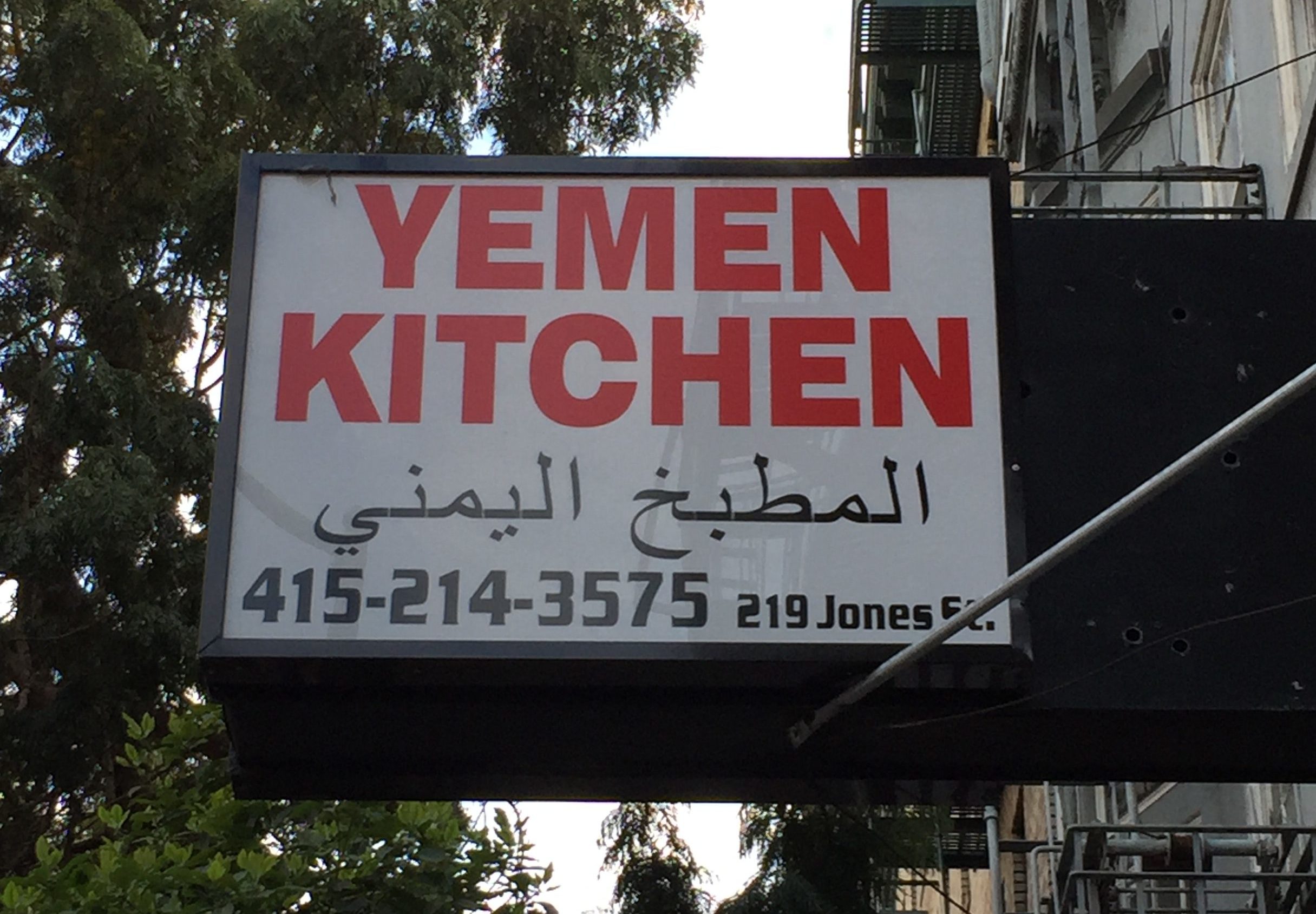
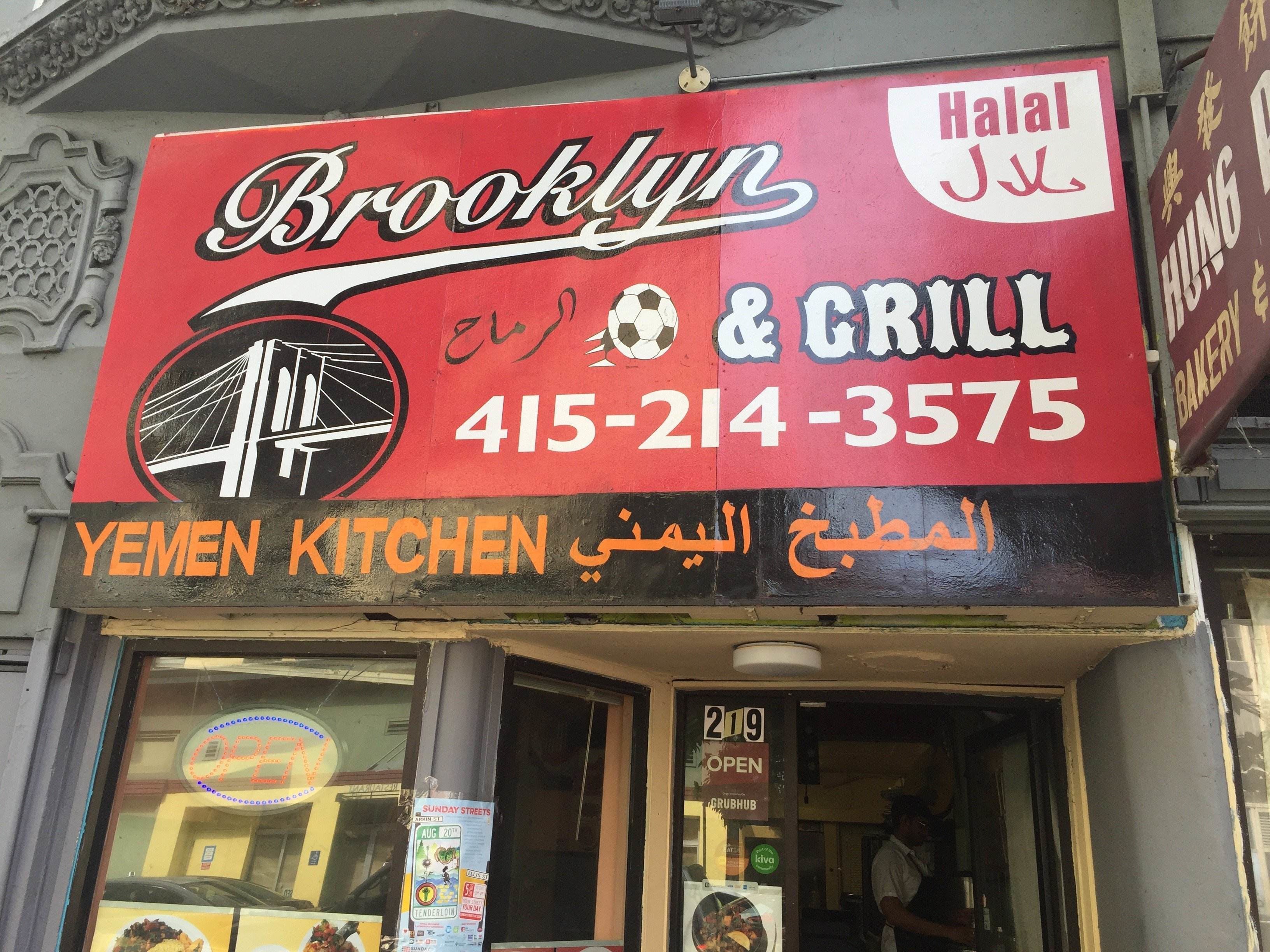
He works 12 hours a day, 7 days a week, making homemade dishes from his native country in his tiny restaurant on the edge of San Francisco’s Tenderloin district. The care he puts into each dish, the subtle spicing and the classic combinations appeal to those who remember Yemeni food from their childhoods far away and those who have never been there.


Al Rammah opened Yemen Kitchen in June 2015, it’s the culmination of a life working in food service but it’s not his first venture into restaurants. Pretty impressive for a man who admits that growing up in the town of Albeda with his parents and 7 siblings, he couldn’t even make tea. In keeping with the traditional family structure, his mother and sisters took care of all the cooking for the men. “I didn’t appreciate it at the time, but now I do,” he says smiling.
NEW YORK
In 1986, at the age of 22, while working as a clerk in an electric utility office in Yemen, Al Rammah took a vacation to visit his brother, who was attending college in New Mexico. After two months there, he ventured on to New York City to visit friends and they convinced him to stay on in “the land of opportunities.” In an always-busy Manhattan deli he began learning about American culture by working 12 hours a day, making sandwiches from 7pm -7am. Then from 8am until noon, he attended English classes. After a meal, a few hours sleep and a shower, he would head back to the deli. It was a grueling schedule for a little pay. “But I enjoyed making food and I never got bored,” says Al Rammah. He stayed New York for one year.
MICHIGAN
One day, a man from the sizable Yemeni community near Detroit, Michigan contacted him. Al Rammah had achieved renown as a star soccer player on a successful team when he lived in the Yemeni capital of Sana’a. The man knew him by reputation and invited him to come to Michigan to join their team in the Michigan-Ontario league. This was in 1987, before soccer was “discovered” by the American public in 1994, when the US first hosted the FIFA World Cup.
Al Rammah was happy to accept the offer. “Soccer was in my blood,” he says. “It was good team with a lot of nationalities, including members from Italy, Albania, Lebanon and Iraq.” He also coached the Yemen youth club (ages 19-21). “But you can’t play soccer all day,” he says. “So I started working at the restaurant owned by the head of the Yemeni community. We served American food, burgers and omelets. I learned a lot from the experience. Work in the mornings, soccer in the afternoons.”
He loved Michigan and lived there almost 20 years. He put down roots, got married, got his papers and because he loved cooking and saw it as a career path, attended the culinary arts program at Macomb Community College in 1995. The next year, he opened his first restaurant, Al-Rasheed, in Hamtramck, and with a partner followed up with three more in the next few years.
SET UP NEW RESTAURANTS
Al Rammah realized that what he really enjoyed, and was quite good at, was the process of starting a new restaurant project from scratch. From installing a ventilation system, figuring out the menu, printing business cards and flyers, to getting the word of mouth out to attract new customers. “Sometimes I worked very hard for two or three months doing all the preparations, before I ever got paid.” In one five year-period, he was on the move. He helped out a friend who had a Middle Eastern restaurant in Indiana for a year and returned to work with a restaurant in Detroit. Then he opened “Sana’a Restaurant” in Brooklyn, but after three years sold his share, and helped out at a friend’s restaurant in Port Huron, Michigan.
SAN FRANCISCO
In July 2011, the owner of a struggling Yemeni food restaurant in San Francisco heard about Al Rammah and called him in Port Huron to come help with his restaurant. “I didn’t know him, but he offered to pay my flight,” says Al Rammah. “So I said sure, I’ll check it out. I came straight from the airport to his restaurant and never went back.”
The good weather and the mix of friendly people from everywhere appealed to Al Rammah. He became a chef at Yemeni restaurant. “After six months, the owner insisted I become a partner. He needed my experience and wanted to keep me, so he made me a ¼ partner. But after two years, I found I was doing most of the work and sold my share.” Then he worked for two years as a chef at Café Med in the Financial District.
“I have a bad habit,” Al Rammah says with a laugh, “I always want to open another restaurant, so I looked around for a space.” He found his present space, a former Brooklyn Pizza spot, on Jones Street (which also spent time as a Mexican Yucatan eatery).
It still sports the red and white Brooklyn Sign outside. “I haven’t had time to change it but I painted over where it said “Pizza” it now says “Halal” with my name in Arabic writing,” explains Alrammah. (It also sports the ever-meaningful image of a soccer ball.)
Yemen Kitchen’s cozy space has three tables and three stools. The walls are sparsely decorated with an oud (a pear-shaped lute), a sword, traditional Arabic cloth, plus framed photos of his old soccer teams in Yemen. “Some people come in and recognize me,” Al Rammah admits, “we were that well known.”
The afternoons can find a mix of regular customers (from Algeria, Tunisia, Morocco, Sudan as well as Yemen) who appreciate the homemade Yemeni food and sweet, cinnamon spiced tea. They catch up and chat about news, politics and life. When it first opened, Yemen Kitchen had 80% Yemeni customers, some, who in their excitement, came several times a day. But nowadays, thanks to good reviews on Yelp and a small article in the San Francisco Chronicle, the balance of American customers outweighs the Yemenis. Take-out orders are popular too.
Yemen Kitchen is open 10am-10pm, and Al Rammah cooks all the meals himself. Besides the regular lunch and dinner customers, two to three times a week, he cooks extra servings for catering gigs. Customers pick up food for 30-50 people in schools, offices or social gatherings and once in a while Al Rammah prepares enough for several hundred guests at a Yemeni wedding.
The dishes are listed on two menus: his original faded blackboard with only Arabic lettering, flowers and of course, a soccer ball and a typical folding menu with English. Al Rammah confides that both menus contain the same “inside jokes.” A handful of dishes are named after famous Yemeni personalities, actors and comedians. For example, Dihbashy (beans and eggs) is actually the name of a famous Yemeni actor. “My Yemeni customers see that and laugh,” adds Al Rammah.
EAT WITH HANDS
In Yemen, like many neighboring countries, food is eaten with the hands (specifically the right hand), by tearing off a piece of bread and using it to scoop up the meat and sauce. “Here is like a little Yemen, and it feels like home, so of course customers eat with the hands here too.” He points to the back. “We have a hand-washing sink, with soap and paper towels. ” Sometimes Americans see other diners eating with their hands and they want to see what it’s like. “Sure, Al Rammah says, “I encourage them. You’ll taste more with your hands than a spoon and fork. Try it, you will like it.”
THE CUISINE
Yemeni food is unique, and although there are influences from Turkish and Indian cultures, I was unprepared for how distinct it would be from the Middle Eastern cuisine of its neighbors. Going into the restaurant, my pre-conceived expectation was that it would be very similar to what I call generic Arabic cuisine: simple and flavorful, but bland compared to Indian or Thai food. Wrong!
We ordered chicken kabsah, roast lamb, hummus and tawah bread. The hummus was extremely creamy and was amazing with the tawah, a griddled whole-wheat flatbread, similar to the Indian paratha. The roast lamb featured succulent chunks of marinated lamb, roasted to perfection and served with basmati rice and a vegetable stew. The accompanying sahawiq, tomatoes, green chili peppers, garlic and cilantro blended together to a salsa-like consistency, allowed one to ‘kick it up a notch’, should they prefer a little more heat. No such augmentation was called for with the kabsah, a meat and rice dish similar to an Indian biryani or Arab mandi, but distinct from both. It was a spicy blend of chicken and basmati rice, redolent with chopped Serrano peppers and delicious.
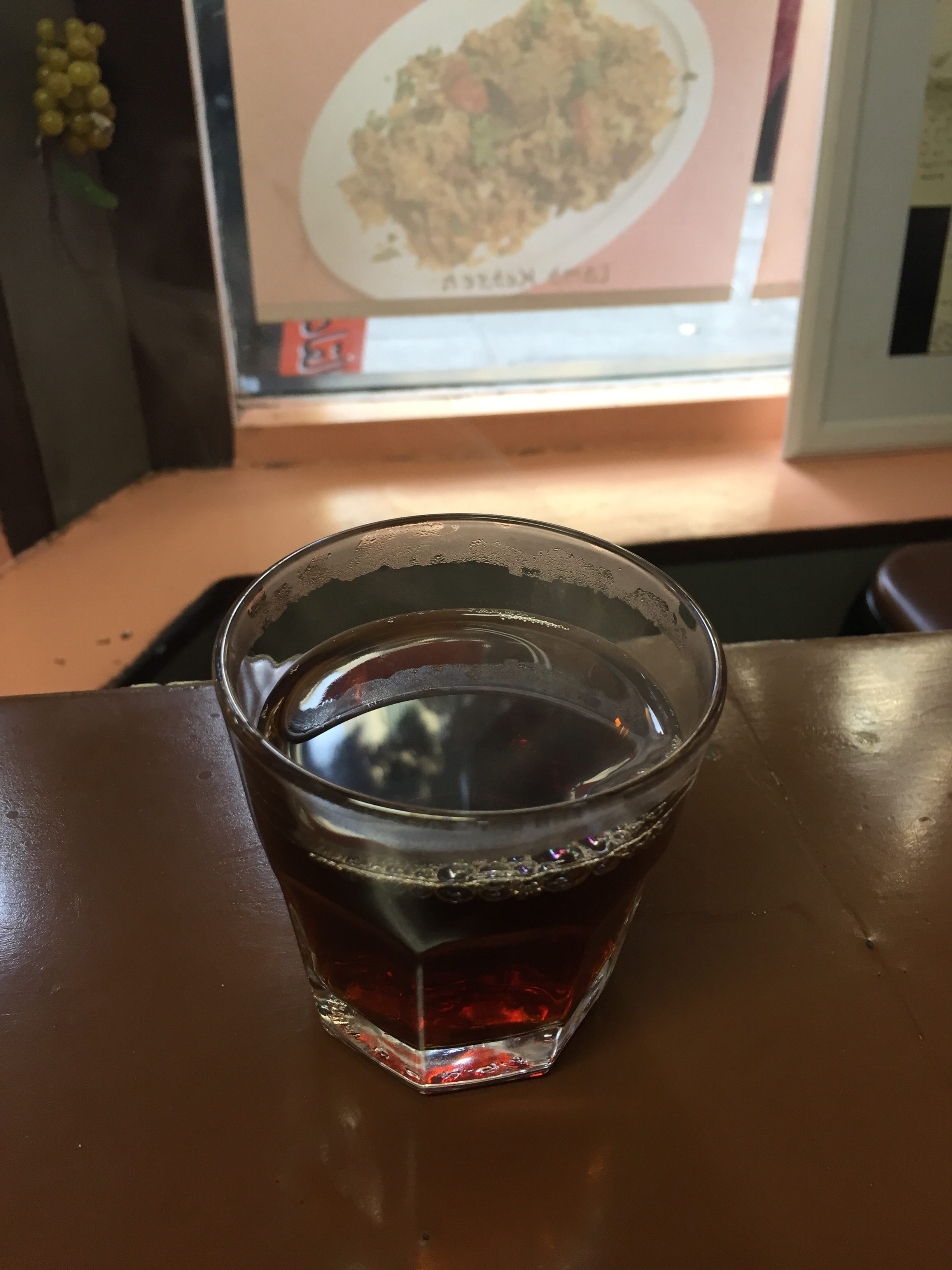

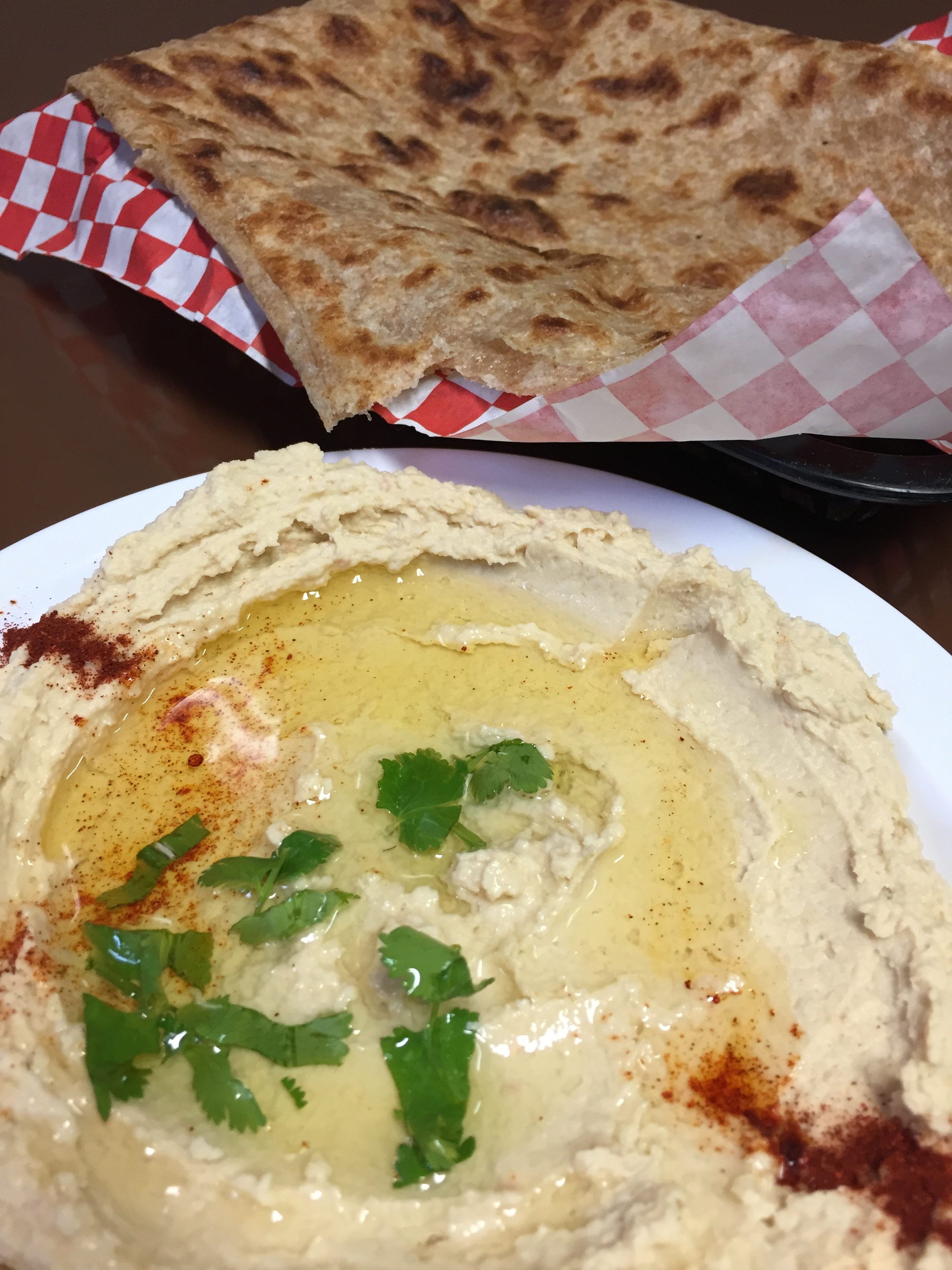
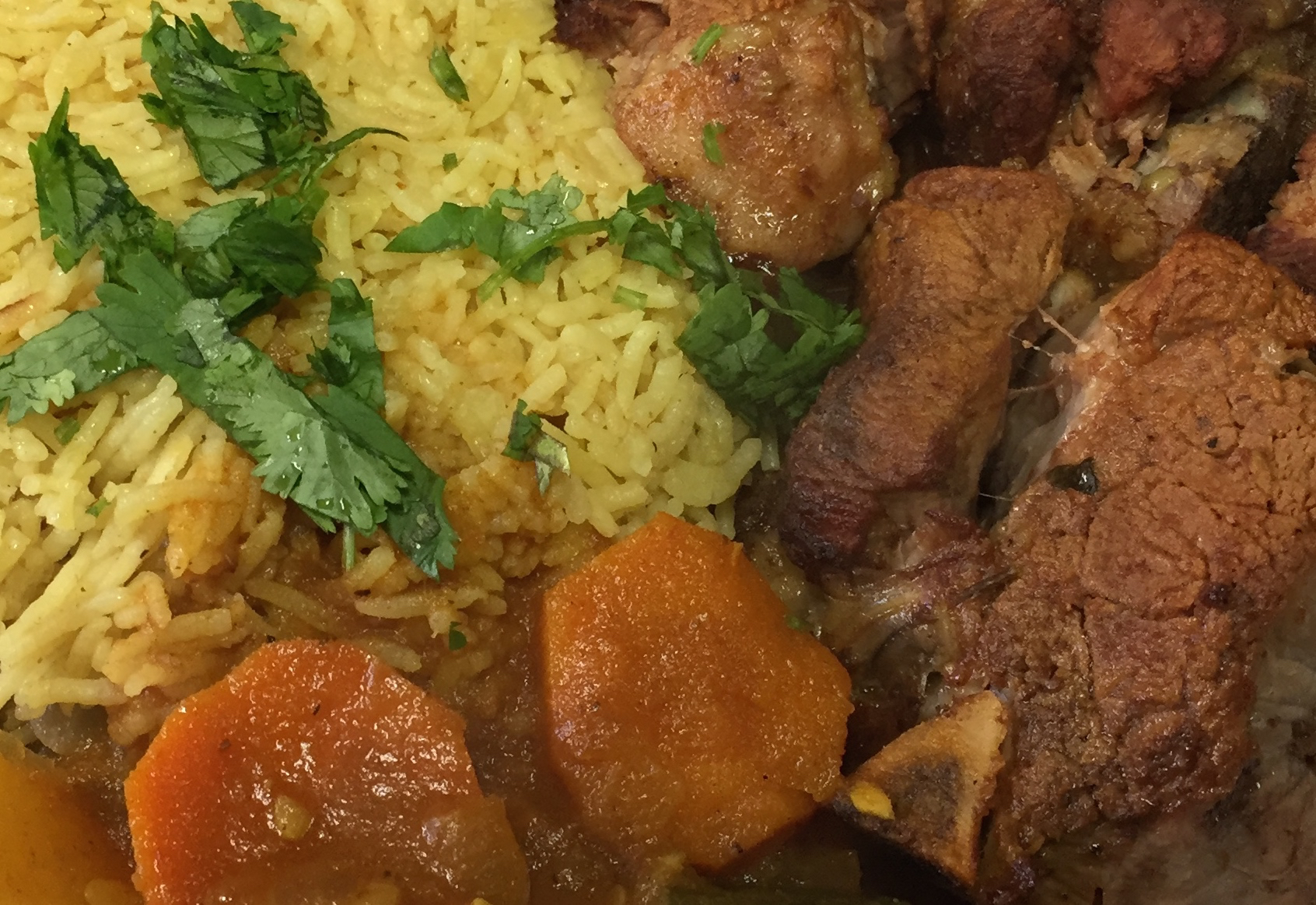
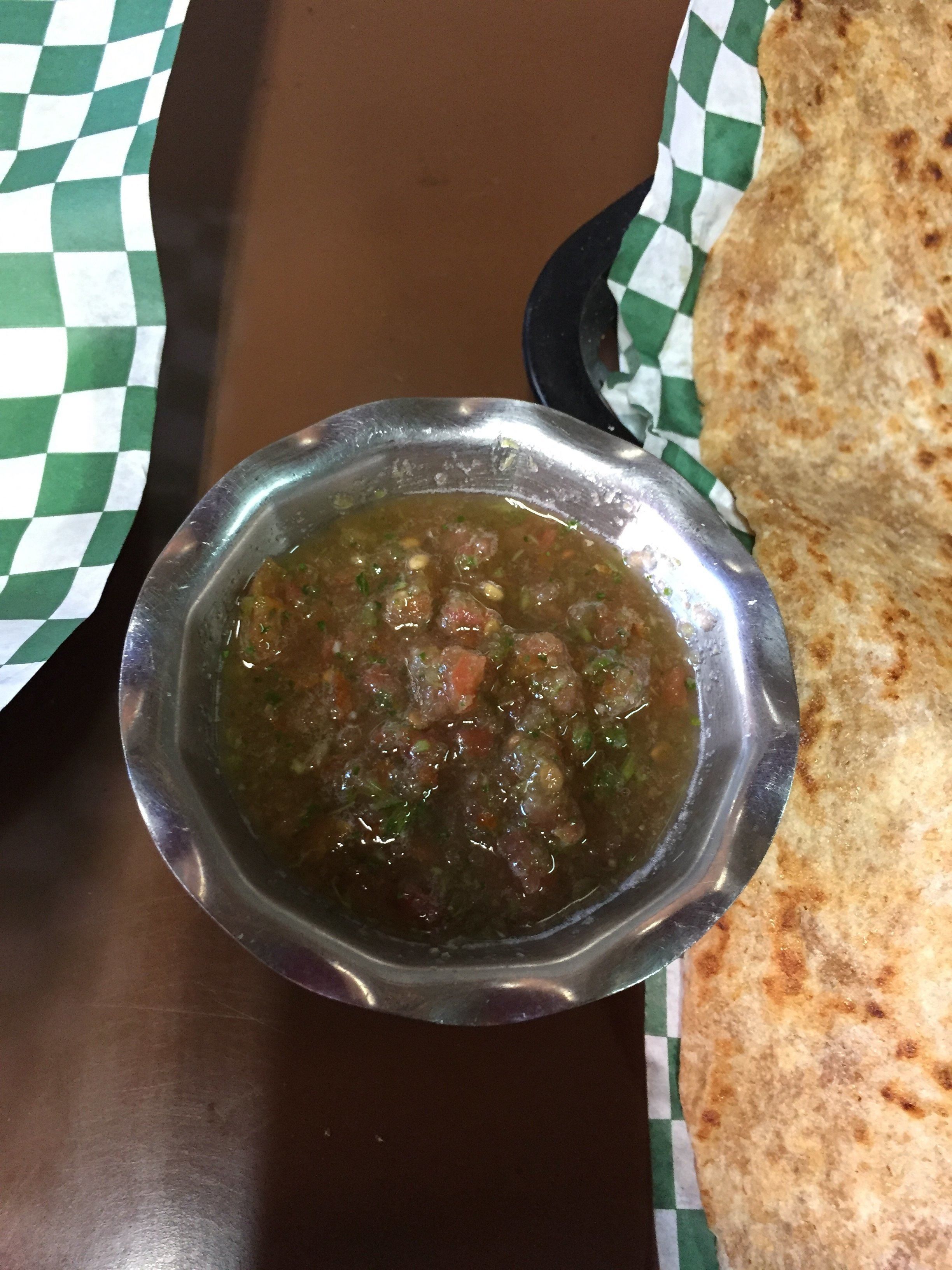 Our second visit we decided to begin with the national dish of Yemen, saltah. The base is a stew of meat and vegetables or maraq to which is added sahawiq, and the piece the resistance, holba or whipped fenugreek puree. The stew is served piping hot in a stone bowl and is best eaten with one’s fingers using pieces of tawah or pita as utensils. This was my favorite dish by far, with the holba providing an herbaceous counterpoint to the unctuous lamb. We also ordered zanbakah, a fragrant stew of ground beef and pureed fava beans topped with chopped onions, chili peppers and cilantro, again eaten with pieces of tawah. The roast chicken platter comes with a generous portion of bone-in marinated chicken roasted till the skin is browned and crispy and served with turmeric scented basmati rice and vegetables.
Our second visit we decided to begin with the national dish of Yemen, saltah. The base is a stew of meat and vegetables or maraq to which is added sahawiq, and the piece the resistance, holba or whipped fenugreek puree. The stew is served piping hot in a stone bowl and is best eaten with one’s fingers using pieces of tawah or pita as utensils. This was my favorite dish by far, with the holba providing an herbaceous counterpoint to the unctuous lamb. We also ordered zanbakah, a fragrant stew of ground beef and pureed fava beans topped with chopped onions, chili peppers and cilantro, again eaten with pieces of tawah. The roast chicken platter comes with a generous portion of bone-in marinated chicken roasted till the skin is browned and crispy and served with turmeric scented basmati rice and vegetables.
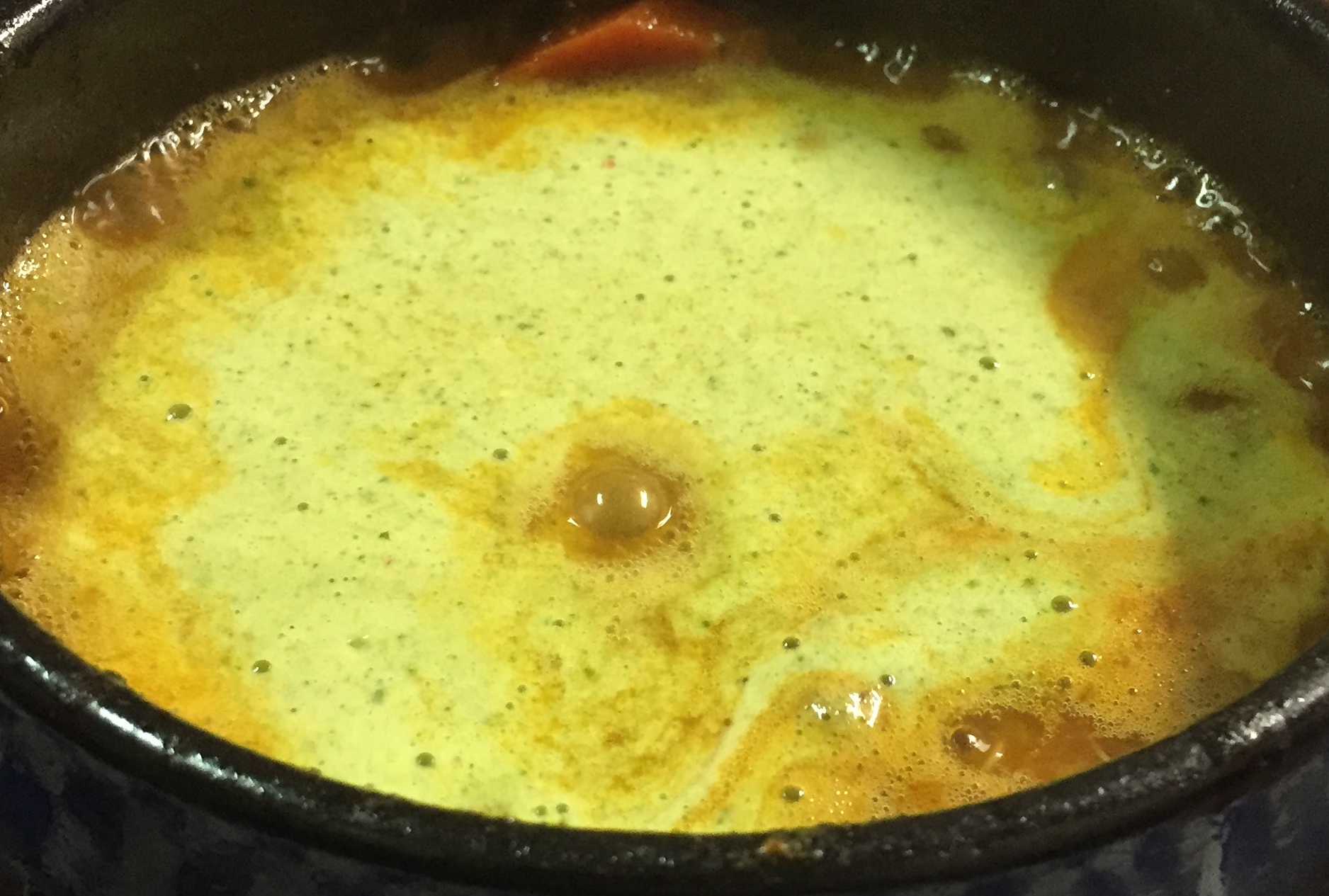


Unfortunately, we did not get to try any of the breakfast dishes or desserts. That is for next time – and, yes, I am more than willing to repeatedly venture forth into the nether recesses of the Tenderloin for more. Go ahead, don’t let the rather colorful neighborhood put you off – I promise you the Yemeni food, and Al Rammah’s hospitality will be well worth the effort!
SITUATION NOW IN YEMEN
One can’t talk about Yemeni food without acknowledging the famine, malnutrition, lack of clean water and cholera epidemic that has hit the country hard since the political crisis that began in 2011 and civil war that started in 2015. It is presently the poorest country in the Middle East.
Although, some of his siblings are still in Yemen, he has not been able to visit since 2010 “it’s not safe to go there anymore.” He is thankful that his family members are all right for now, and explains, “It’s worse for the poor people who don’t live in big cities and have no relatives to turn to. There is basically no government, no social system in place to help them. The government is just corrupt and doesn’t take care of its people.”
Yemen is an ancient land in the Middle East with settlements in its green hills and mountains, going back at least 5,000 years, to before King Solomon’s time. It is the land where the Queen of Sheba is said to have lived. Its long seacoast borders The Red Sea and the Gulf of Aden. Several centuries before Islam, Yemen was renowned for its painting, temples, palaces and irrigation system.
Al Rammah describes one of its most beautiful spots, the famous mud brick “skyscrapers” in Shibam, Hadramaut. Most of the buildings in this walled city, with seven-story tower dwellings rising dramatically out of a cliff, date back to the 16th century, some even hundreds of years earlier. It is recognized on the UN World Heritage list.
Al Rammah would like to employ Yemeni cooks to help out in the kitchen since they know the cuisine well, but they are not that easy to find, so he takes on and trains others, at present, one cook is from India, the other from Tennessee. Both of them are eager to learn to cook the delicious, classic Yemeni dishes Al Rammah seemingly effortlessly turns out. Meanwhile they chop endless onions, plate and serve the meals, bus and wash dishes. For now, Al Rammah cooks his special dishes everyday for whoever comes in his restaurant, enjoying feeding friends and strangers alike. “I can’t take a vacation, “he says. “It’s good I only live a block away; this restaurant is like my second home.” Then he adds thoughtfully, “But I am thinking that I might just open another restaurant too.”

